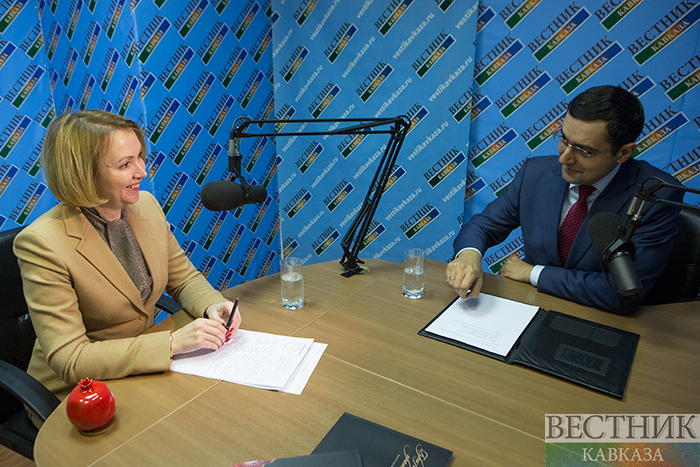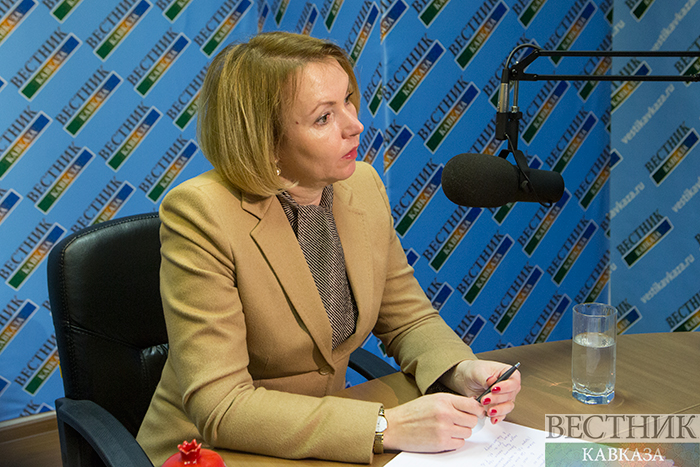Tribune’s guest is Irina Hecht, the Deputy Chairwoman of the Federation Council Committee for Agricultural and Food Policy and Environmental Management, the senator from the Chelyabinsk Region.
- Irina Alfredovna, you represent the Chelyabinsk Region in the Federation Council. The region is one of the pioneers of the nuclear industry. It was due to the work of the employees of the Mayak Industrial Group that the country has the opportunity to possess nuclear weapons. It helped the USSR to create a balance with the USA in 1949. There are problems connected to those times when the nuclear industry was born. Lake Karachay disappeared from the map of the Chelyabinsk Region not long ago. Could you please tell us about this?
- Due to the Mayak Industrial Group, we took really important geostrategic, geopolitical positions in the world. However, we made a lot of mistakes at that period due to a lack of knowledge, as it was happening for the first time. We wanted the contribution to development of the country to be appreciated in a separate law on social protection of citizens who used to live on these territories and worked in the industrial group.
In the early 1950s, waste was dropped into the River Techa. When we realized that this should not have been done, Lake Karachay appeared, in which all the waste which couldn’t be utilized was dumped. The situation was announced only after the accident at the Chernobyl Nuclear Power Station. And our citizens were included into categories which were required by the Chernobyl Law. It was a cry from the depths for many people, especially for the old. The separate law is a tribute to the labor achievement which was reached at the time. Nuclear waste started being dumped into Lake Karachay in 1951. And there was a threat that the underground waters could be polluted in case of some weather conditions; a tornado could spread the waste. It happened in 1967. There was a lack of water and Lake Karachay partially dried up. Nuclear waste was spread from the bottom of the lake.
Citizens who were touched by the Eastern Ural Radioactive Trace were not socially protected. Today they have to prove the facts of their residency there through the courts. The lake began to be eliminated in 1986. On November 26th 2015 a historic event took place – it was the conservation of Lake Karachay and some supportive facilities and communications. The lake was covered with rocky soil and concrete blocks. Today there are plans to establish several hydro-isolating layers to prevent pollution of the underground waters.
A place which had caused sharp social criticism and a tense environmental situation disappeared from the region’s map. There were talks about irresponsible environmental organizations which could cause disasters. However, it didn’t happen due to the technologies of Rosatom. Moreover, about 17 billion rubles were invested there within the federal program. Rosatom deals with its industries responsibly, solving the environmental problems which appear.
I wish other enterprises were also responsible for their wastes and consequences which followed their production.
- How dangerous was it?
- The critical situation was in 2000. There was a lot of water, and the lake was almost full. Water could have overflowed the banks. Rosatom tried to find a solution. It built fences and hydro-isolating facilities. The situation hasn’t been out of control since 1967.
Measures for controlling the water level were taken in 1967. Work has been carried out all the time. The bog was covered. In recent years, it wasn’t a lake, but a bog. As a result, the situation was settled without any harm to the environment of the region.

- The Chelyabinsk Region is famous not only for its nuclear industry. It is a very beautiful region – forests, mountains, local crafts, hospitable local residents. What interesting options can the Chelyabinsk Region offer tourists?
- New Year vacations are a time of skiing. And the Chelyabinsk Region is able to compete with European skiing resorts, according to our slopes and infrastructure. Today we have three mountain skiing centers.
A resort with the most advanced infrastructure, modern hotels and cottage villages is situated near the town of Miass – Sunny Valley. People go there to ski, take a rest, and see the beautiful sights of Mount Taganai. This winter should be warm, and it would be great to spend the New Year's vacation there.
There is the Zavyalikha Mountain Skiing Resort. It has chairlifts and modern equipment. The mountain is higher, and it has steeper slopes. It has the necessary infrastructure to spend a vacation there and to ski.
The famous resort of Abzakovo operates near Magnitogorsk. Our President has skied on slopes of the resort many times. If you haven’t made up your mind yet, you should find information on the Internet. I think our mountains are no worse than the European ones. We invite everybody. I am sure people won’t be sorry about the time which they will spend in the Chelyabinsk Region.
Abzakovo hosted a student winter sports competition; Sunny Valley hosted the European Skateboarding Championships. The infrastructure of winter sports is adapted to European events. Federal resources were invested into building slopes and infrastructure to hold world championships there. The Chelyabinsk Region sent an application to hold the SCO summit in 2020. The application is being considered now. It means our infrastructure corresponds to European standards.







